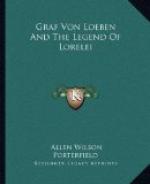Gottliebe geb. von Bressler and established there his
permanent abode. In 1822 he suffered a stroke of apoplexy from
which he never recovered: even the magnetic treatment given him by
Justinus Kerner proved of no avail. He died at Dresden, April 3,
1825. See Allgemeine deutsche Biographie, XIX, 40-45. The
article is by Professor Muncker. Wilhelm MUeller also wrote an
article full of lavish praise of Loeben in Neuer Nekrolog der
Deutschen, III, Jahrg. 1824, Ilmenau, 1827.
[2] Meyer (6th ed.) does not mention Loeben even in
the articles on
Fouque and Malsburg, two of
Loeben’s best friends; Brockhaus
(Jubilee ed.) mentions him
as one of Eichendorff’s friends in the
article on Eichendorff, but
neither has an independent note on
Loeben. Nor is he mentioned
in such compendious works on the
nineteenth century as those
by Gottschall, R.M. Meyer
(Grundriss and Geschichte),
and Fr. Kummer. Biese
says (Deutsche Literaturgeschichte,
II. 436) of him: “Auch
ein so ausgesprochenes Talent,
wie es Graf von Loeben war, entging
nicht der Gefahr, die Romantik
in ihre Karikatur zu verzerren.”
[3] Cf. Allgemeine deutsche Biographie, XIX, 42.
[4] Partial lists of his works are given in:
Goedeke,
Grundriss, VI, 108-10
(2nd ed.): Allgemeine deutsche
Biographie, XIX. 40-45;
the sole monograph on Loeben by
Raimund Pissin. Otto Heinrich
Graf von Loeben, sein Leben und
seine Werke, Berlin, 1905,
326 pages. By piecing these lists
together—for they
vary—it seems that Loeben wrote, aside from
the works mentioned above,
the following: 1 conventional drama, 1
musical-romantic drama, 2
narrative poems, one of which is on
Ferdusi, 3 collections of
poems, between 30 and 40 novelettes,
fairy tales and so on. and_
“einige tausend” aphorisms and
detached thoughts. It
is in Pissin’s monograph that Loeben’s
position in the Heidelberg
circle of 1807-8 is worked out. as
follows: Loeben and Eichendorff
constituted one branch, Arnim and
Brentano the other, GOerres
stood loosely between the two, and the
others sided now with one
group, now with the other.
[5] The verses are from GestAendnisse, No.
125 in Pissin’s
collection of Loeben’s poems.
[6] GestAendnisse. No. 125.
[7] Aside from the reviews, letters, and individual
poems reprinted
here and there, the following
works were accessible to the writer:
(1) Das weisse Ross, eine
altdeutsche Familienchronik; (2) Die
Sonnenkinder, eine ErzAehlung;
(3) Die Perle und die Maiblume, eine
Novelle; (4) Cephalus und
Procris, ein Drama; (5) Ferdusi; (6)
Persiens Ritter, eine ErzAehlung;
(7) Die ZaubernAechte am Bosporus,
ein romantisches Gedicht;
(8) Prinz Floridio, ein MAerchen; (9)
Leda; eine ErzAehlung; (10)
WeinmAerchen; (11) GesAenge.




